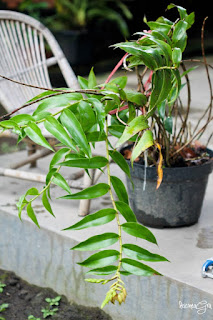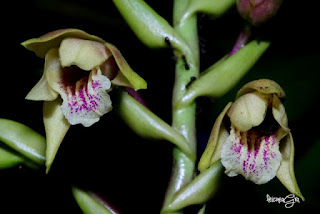Stem 1-1.5 m long by about 7 mm in diameter, many placed together on the rhizome, bearing leaves along their length placed 2-5 cm apart.
Inflorescences terminal, rarely branched, to 15 cm long, bearing about 10 flowers placed 2-5 cm apart; floral bracts long-oval, acute very concave, 2-3 cm long.
- Flowers not opening very widely. mostly pale pink with darker pink on the lip;
- Sepals and petals similar, lanceolate, acute, 2.5 cm long by 6 mm broad;
- Lip trilobed, with three ridges which extend almost the whole length, the side lobes obtuse, short but very broad, extending three-quarters of the total length, the mid-lobe ovated, its margin erose, the apex recurved;
- column slender, yellow with some violet spotting.
Name Overview: Dilochia cantleyi (Hook.f.) Ridl., J. Linn. Soc., Bot. 32: 332 (1896).
Distribution:W. Malesia 42 BOR MLY SUM
Lifeform:Hemicr. or epiphyte
Family:Orchidaceae
Original Compiler:R.Govaerts
Synonyms: Dilochia cantleyi (Hook.f.) Ridl., J. Linn. Soc., Bot. 32: 332 (1896).
Homotypic Names:Arundina cantleyi Hook.f., Fl. Brit. India 5: 858 (1890).Basionym/Replaced Synonym
This name is Accepted by:
Govaerts, R. (2003). World Checklist of Monocotyledons Database in ACCESS: 1-71827. The Board of Trustees of the Royal Botanic Gardens, Kew.
Wood, J.J., Beaman, T.E., Lamb, A., Lun, C.C. & Beaman, J.H. (2011). The Orchids of Mount Kinabalu 2: 1-726. Natural history publications (Borneo), Kota Kinabalu, Malaysia.
Sulistiarini, D. (2012). The orchid genus Dilochia in Indonesia. Reinwardtia 13: 379-387.
Notes :
This specimen collected from Rejang Lebong, Bengkulu Province, Indonesia
" Inflorescences are usually not brached, but a few specimens from Borneo and Maluku have one or two branches. this species can be found as a low growing epiphyte, or sometimes as a terrestrial on ridges, or in poor soil area" ( Orchids Of Sumatra, J.B Comber )
*Orchids Of Sumatra, J.B Comber
*https://wcsp.science.kew.org/







No comments:
Post a Comment